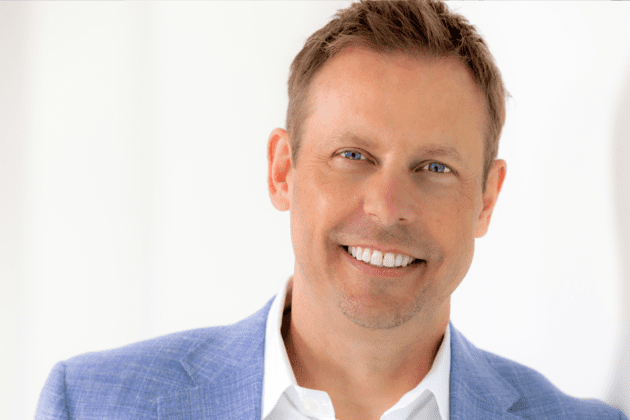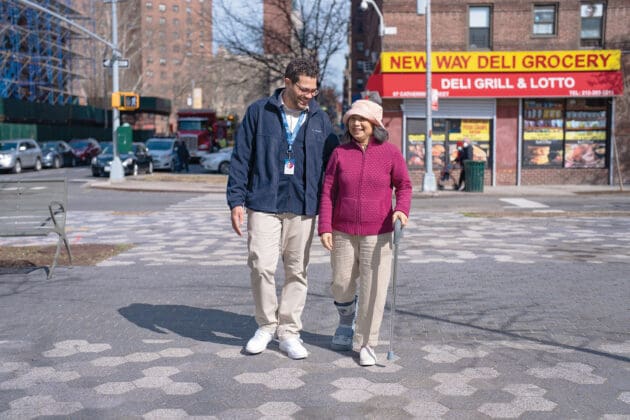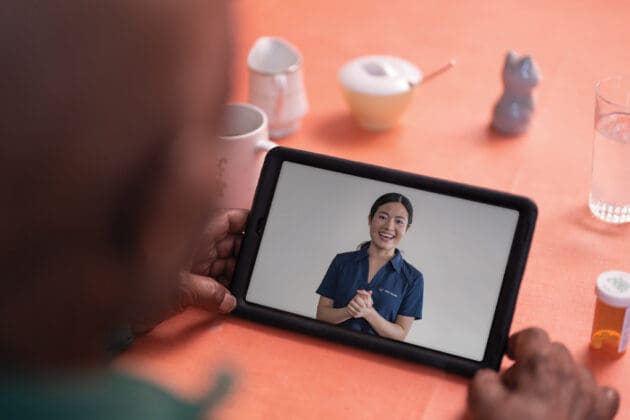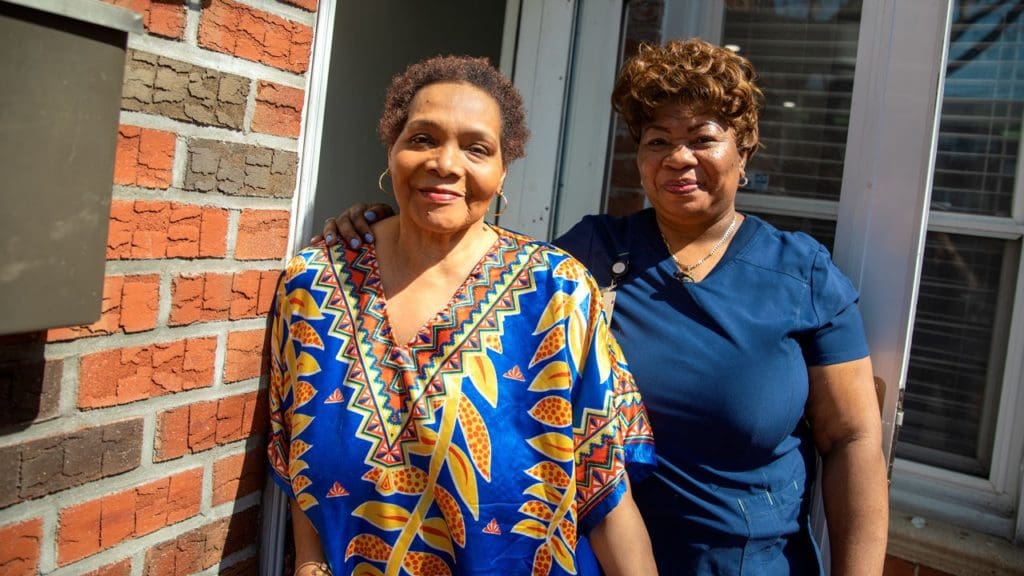
Each morning when home health aide Marie Dorviline knocks on her client’s door, she hears a delighted voice inside the apartment saying, “It’s got to be Marie!”
For the last five years, Marie has been providing daily assistance to Yanick Pierre-Louis, making sure the 68-year-old can live safely in her Brooklyn apartment as she struggles with rheumatoid arthritis, diabetes, coronary artery disease and memory issues, among other ailments. Marie sees that Yanick takes her medicine, eats the meals she should when she should, gets to her medical appointments, and does not pitch into a downward emotional spiral.
When Yanick looked sad the other day, telling Marie, “I don’t feel alive… I can’t do anything for myself,” Marie quickly countered: “You have me, and I’m helping you feel better.” That drew a smile, and Marie continued, “When I’m here, there no place for you to think negatively.”
After learning that her client used to dance when she was younger, Marie found some music on YouTube — which quickly ended the negative thinking. As the two were dancing, Yanick’s daughter called to ask after her. “You don’t need to worry,” mother told daughter. “I’m happy now.”
Similar rituals continue every day in millions of homes across the country, as home health aides attend to the physical and emotional needs of those who are ill, injured, recovering from hospitalization, elderly or otherwise homebound. Each year, more than 2.4 million home health aides provide companionship and assistance with activities of daily living for some 8.6 million Americans.
Changing the Equation
While they are vital members of the care team responsible for clients’ daily well-being, home health aides can be undervalued in terms of both the benefits they provide and their dedication to their clients.
Recent wide-ranging research into personal home care workers aims to change the equation. Researchers from Weill Cornell Medicine have embarked on a multipronged, multidisciplinary study to chronicle the value that HHAs add to the health care ecosystem. Among the researchers’ findings is the fact that the role of home health aides, once thought to involve only help with personal care, has broadened to include help with medical care “such as the maintenance and management of chronic conditions and acute complaints,” as well as emotional care and support.
Today, the U.S. faces a dire shortage of home health aides, a gap that is projected to grow as America ages. If we want more of these talented and compassionate workers in our homes caring for our loved ones, HHAs need to be compensated at a level more commensurate with their value, and reimbursement to the companies employing them has to be in place to make that possible.
Unfortunately, President Biden’s proposal to pay caregivers more and expand the caregiving workforce (originally part of his Build Back Better agenda), did not make it into the Inflation Reduction Act that was recently signed into law.
Here in New York, VNS Health, where I work, joined with a broad coalition of home care providers, disability and aging advocates, labor unions and worker rights groups to advocate for Fair Pay for Home Care — legislation that would raise the minimum wage for home health aides to $22.50 an hour, and provide the funding to pay for it (the minimum wage is currently $15 an hour in New York City and the suburbs now, and even less in upstate New York). We made some progress this year, securing a $3 increase over two years in our state budget. But more must be done to attract and retain these critical workers.
HHA’s essential role in the home care ecosystem came into particularly sharp focus at the height of the Covid-19 pandemic, when home health aides in New York City and other Covid-19 hot spots frequently went into clients’ homes, putting themselves at risk in order to care for those most in need. The Center for Home Care Policy & Research at VNS Health has been analyzing the work done by HHAs during the Covid-19 pandemic with an eye towards ensuring their safety in the future.
Home health aides were found to be particularly vulnerable during the public health crisis, both economically and physically, as they dealt with challenges such as early shortages of personal protective equipment and a complex vaccine rollout. The study concluded that “home health aides are essential to the health care system” and offered recommendations for putting supports in place before the next public health crisis.
CLICK HERE for an Issue Brief.
Marie is a good example of the quiet bravery that home health aides have consistently displayed over the past two-and-a-half years. Throughout the Covid-19 pandemic, Marie continued caring for Yanick. “I had no choice — she needed me,” Marie says of her client. “My family was scared for me, but I said, ‘I have a responsibility. I have another mother, and I have to be there for her.’”
Marie never for a moment regretted her decision. The only thing she regrets is how HHAs were overlooked while other health care workers were hailed as heroes. “I’m looking at the TV, they cheer for the nurse, they cheer for the doctor,” said Marie. “Yes, they’re heroes, but we are there, too, putting our lives on the line. We deserve to know that we’re doing a good job.”
I couldn’t agree more! In fact, I can’t say enough about the thousands of home health aides in our own organization who didn’t miss a day or even a shift during the pandemic, and who kept finding new ways to get to where they had to go. They are a truly dedicated and courageous group.
Eyes and Ears of the Care Team
Marie — who is there every day and who counts observational skills as a core part of the job — also reflects the increased responsibilities of today’s home health aides. She is often the first to notice changes in her client, or to see when something is wrong physically or emotionally, when Yanick is not herself or seems to be struggling more than usual.
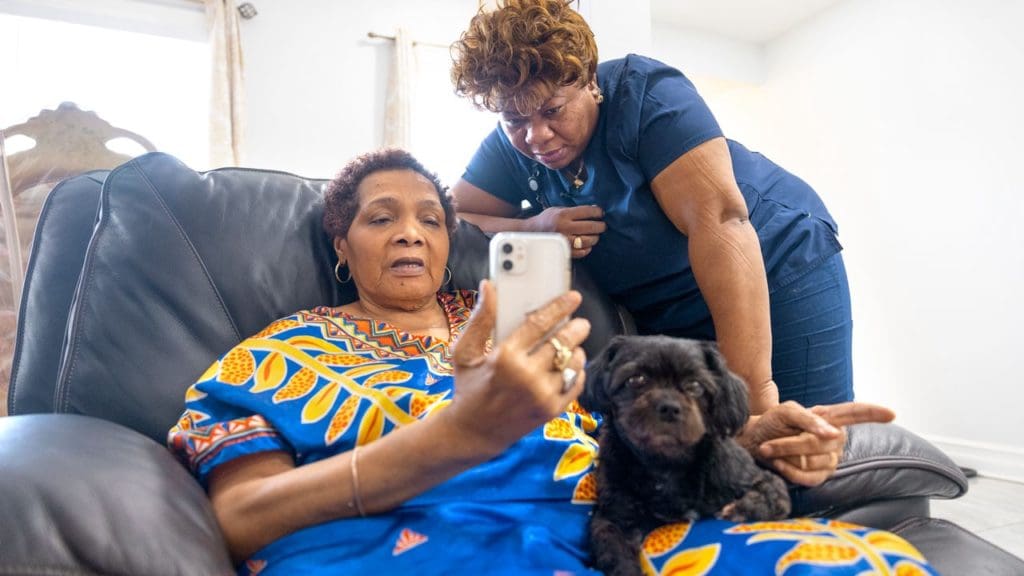
One recent morning, Marie knew just by looking at Yanick that something was wrong. “I said, ‘I don’t like your face. Are you having pain?’ And she tells me she does.” Marie called the doctor, who agreed to see Yanick and treat the pain.
Another time, Marie overheard Yanick’s dermatologist suspect that she had a urinary tract infection. This confirmed a smell Marie had noticed, which had made her worried about infection. But at the close of the appointment, there was no follow-up. That is, until Marie herself said, “Didn’t you say she might have a UTI, doctor?”
Spurred by her prompting, clinicians tested for and confirmed the infection, and prescribed medication. When Marie was told, “You’re a very observant person,” she took it in stride. “I said, ‘Yes, I am. That’s my job,’” she recalled. “If I know something, I have to speak up.”
Marie picks up on even the most subtle clues. “If I’m doing something in the kitchen and she puts her hand on her face like she’s thinking, I say, ‘There’s no time to be thinking.’ And I get her to talk.” That, says Marie, keeps Yanick from getting in a depressed mood.
“I’m trying to remove the sadness,” Marie said, empathizing with the feelings of loss that come with not being able to do the things you used to do. “She says, ‘Without you, I don’t know where I’d be.’ And I say, ‘That’s why I’m here. I’m here to help.’”
Listening to Marie narrate the details of her day inspired me to tell her, “I think you’re a superhero!” While Marie was quick to dismiss, her longtime client knew different. “Yes,” said Yanick, “she is.” And so are the 6,000 other home health aides on our team at VNS Health.
Original Medium article found here.
